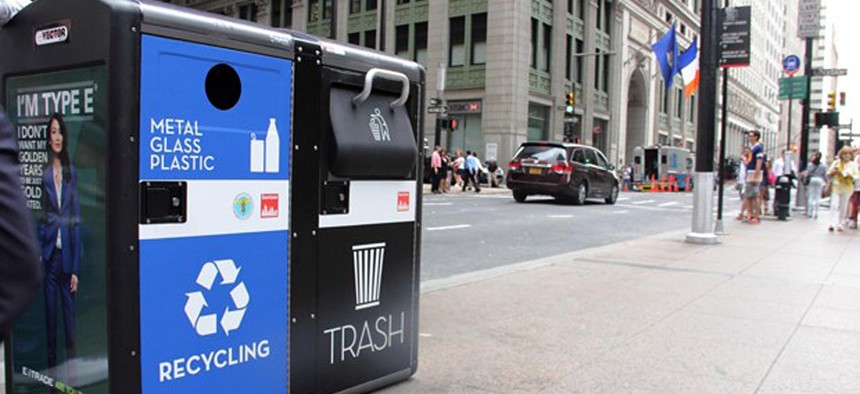New York City Turns Garbage Bins Into Free Wi-Fi Hotspots

Bigbelly
Solar-powered Bigbellies offer enough bandwidth to power a startup.
Garbage cans may no longer be just for junk. Bigbelly, a Massachusetts-based waste management company, is hoping to turn its trash and recycling bins into wireless hotspots throughout New York City.
The project began in downtown Manhattan, where more than 170 of Bigbelly’s solar powered “smart” bins have already been installed. Each container is equipped with a chip that detects when the bin is full or too smelly, allowing trash collectors to make a pick-up where they’re needed most. But the city thought the already-high-tech bin could still use an upgrade.
Last winter, Bigbelly teamed up with New York’s Downtown Alliance to turn two of the containers into hotspots by installing Wi-Fi units inside them. They tested the bins for a few hours a day, measuring the quality of the signal and the number of people who could connect to the network.
The results were promising, says Jeremy Schneider, Chief Technology Officer of Downtown Alliance. At 50 to 75 megabits per second, he adds, the bandwidth will be more than enough to run a small business. Being nestled inside the Bigbelly didn’t compromise the quality of the signal: Since Bigbellies are on street level, the signal didn’t receive any interference from towering skyscrapers.
While free Wi-Fi is the biggest benefit, it’s certainly not the only one. The bins may also be able to help the government collect data about waste management or display public service announcements and alerts.
“We are a smart solar-powered, connected technology platform that is literally sitting in the streets of New York,” says Leila Dillon, Bigbelly’s vice president of global marketing. “We are exactly where the people are.”
Researchers and engineers will conduct more pilot tests throughout the year, and hope to be able to expand the service with the help of sponsorship and grants.
Of course, Bigbelly isn’t the only company trying to bring free Wi-Fi to the bustling streets of New York. Just last year, the city government announced plans to turn almost all of its 10,000 remaining pay phones into state-of-the-art “links,” or Wi-Fi hubs.
In fact, city governments around the world have long eyed citywide wireless Internet access, but many projects have been a bust because of complications with signal interference, quality, and other technical limitations. Some have gotten creative. Startups are looking to turn cities into giant hotspots via cars, trucks, and buses. Even donkeys in Israel and dog poo in Mexico City have been used to connect tourists and park-goers to the internet.
Given NYC’s overflowing trash problem, the project may well be a sigh of relief for the city’s 8.4 million residents and millions of visitors—all of whom could Tweet about their excitement while gazing at the skyline.
NEXT STORY: The Secret Lives of Hackathon Junkies





